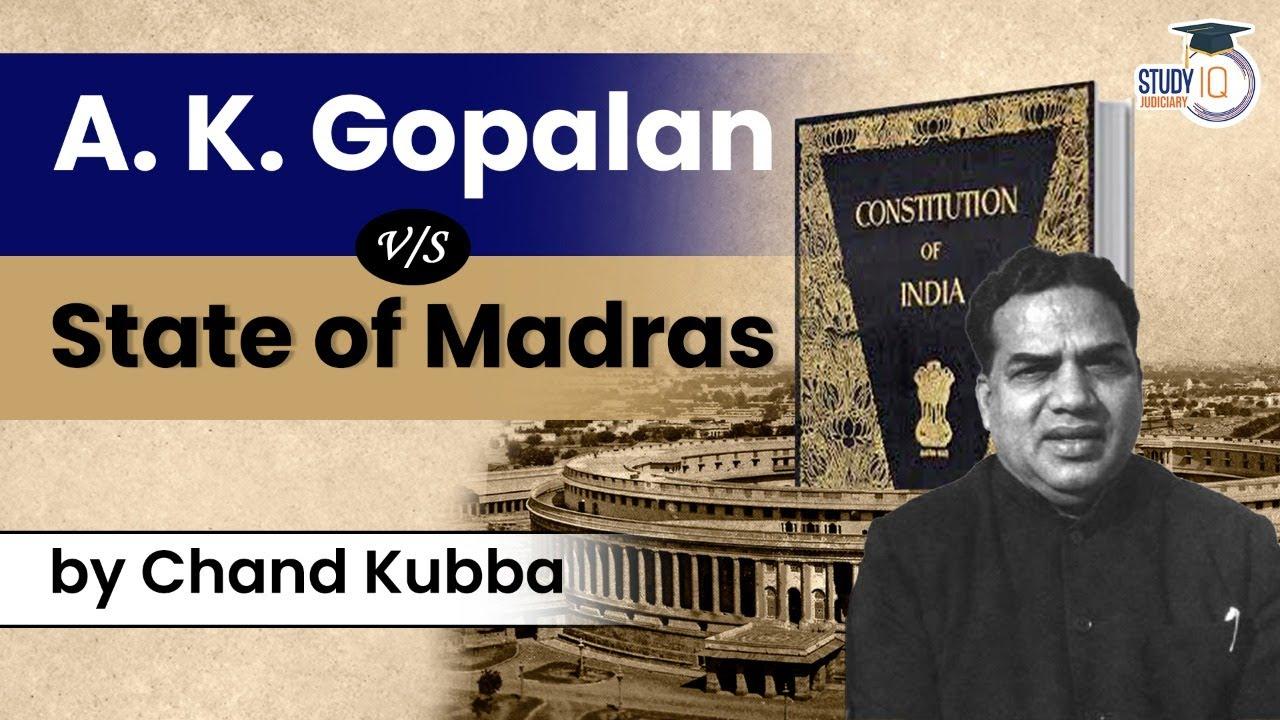Table of Contents
A.K. Gopalan vs The State Of Madras 1950
- Also known as the Preventive Detention Case
- Provided an Opportunity to Indian judiciary to extensively interpret the Fundamental Rights of the Constitution.
- the Court ruled that Article 21 of the Constitution did not require Indian Court’s applying a due process of law standards.

Fact
- A. K. Gopalan – communist leader- was detained under Section 3(1) of the Preventive Detention Act, 1950.
- The provision of Preventive Detention Act, 1950 enabled the Central or the State Government to detain someone in order to prevent them from acting in any manner that violates the national defence, foreign relations, national security, state security, public order, or the maintenance of essential supplies and services.
- Petitioner filed a writ petition under Article 32 of the Constitution, challenging the Act’s validity and submitted that the Act was violative of Fundamental Rights given in Articles 13, 19, 21, and 22.
- He gave various dates in the petition indicating that he has been detained since December 1947.
- He had been sentenced to prison, but his convictions were overturned.
- But then he was served with an order under the said Act.
- 13. Laws inconsistent with or in derogation of the fundamental rights
- 19(1)(d) to move freely throughout the territory of India;
- 21. Protection of life and personal liberty.—No person shall be deprived of his life or personal liberty except according to procedure established by law.
- 22. Protection against arrest and detention in certain cases.
Issues in the Case-
- Whether the Preventive Detention Act of 1950 violates Articles 19 and 21 of the Constitution?
- Whether Procedure Established by Law should be Fair and reasonable?
- Petitioner had contended that a law which takes away one’s life and liberty should follow Principles of Natural justice
- Reasonableness of Preventive detention law should be judged under Article 19
- Petitioner also tried to establish a link between Article 19, 21 and 22.
Decision
- AK Gopalan judgement was delivered by a bench of six judges where the majority opinion in the matter was that Article21 which covered procedure established by law would simply mean to established by the state.
- The court held that the Preventive Detention Act of 1950 does not violates Articles 19 of the Constitution.
- Article 19, which protects the freedom of citizens, does not apply to citizens whose freedom is restricted by law, and thus the question of enforcing Article 19(1) does not arise
Connection between Article 19 and 21 –
- SC held that Article 19 should deal with the specific freedoms given in it and Article 21 should be kept separate from it.
- Article 21 should be held as dealing with freedoms not given in Article 19.
- Thus a law depriving one of Personal Liberty has to confirm to Article 21 and 22 and not to Article 19.
Due Process Of law
- Respondent contended that Due Process of Law as given in US Constitution should be taken as synonymous to procedure established by law but Sc held against it.
SC Ruling necessary meant that
- There should be a Law made by appropriate authority.
- It should lay down procedure to take away ones life and personal liberty.
- The Executive should follow that procedure to deprive one of his life and liverty.
Maneka Gandhi vs Union of India
- Court Re-interpreted Article 21 and practically over ruled the judgement given in AK Gopalan case.
Download| Free PDF






















 WhatsApp
WhatsApp